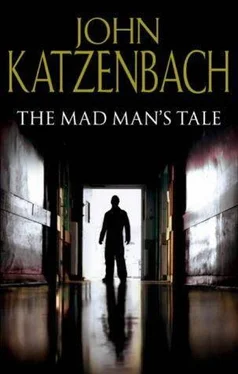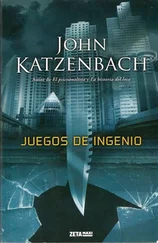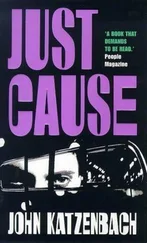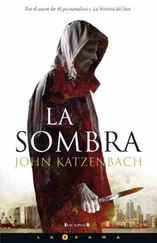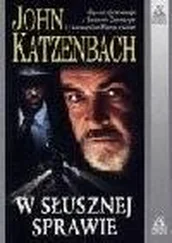John Katzenbach - The Madman
Здесь есть возможность читать онлайн «John Katzenbach - The Madman» весь текст электронной книги совершенно бесплатно (целиком полную версию без сокращений). В некоторых случаях можно слушать аудио, скачать через торрент в формате fb2 и присутствует краткое содержание. Жанр: Триллер, на английском языке. Описание произведения, (предисловие) а так же отзывы посетителей доступны на портале библиотеки ЛибКат.
- Название:The Madman
- Автор:
- Жанр:
- Год:неизвестен
- ISBN:нет данных
- Рейтинг книги:3 / 5. Голосов: 1
-
Избранное:Добавить в избранное
- Отзывы:
-
Ваша оценка:
- 60
- 1
- 2
- 3
- 4
- 5
The Madman: краткое содержание, описание и аннотация
Предлагаем к чтению аннотацию, описание, краткое содержание или предисловие (зависит от того, что написал сам автор книги «The Madman»). Если вы не нашли необходимую информацию о книге — напишите в комментариях, мы постараемся отыскать её.
The Madman — читать онлайн бесплатно полную книгу (весь текст) целиком
Ниже представлен текст книги, разбитый по страницам. Система сохранения места последней прочитанной страницы, позволяет с удобством читать онлайн бесплатно книгу «The Madman», без необходимости каждый раз заново искать на чём Вы остановились. Поставьте закладку, и сможете в любой момент перейти на страницу, на которой закончили чтение.
Интервал:
Закладка:
In a great, curious joke of construction, the Western State Hospital was built on the top of a hill, overlooking the campus of a famous women's college. The hospital buildings mimicked the college, lots of ivy and brick and white framed windows in rectangular three- and four-story dormitories, laid out in quadrangles with benches and stands of small elm trees. I always suspected that the same architects were involved in both projects, and the hospital contractor simply stole materials from the college. From the sky, a passing crow would have assumed that the hospital and the college were more or less the same place. The same bird would have failed to see how different the two campuses were until one stepped inside each building. Then he would have seen the differences.
The physical line of demarcation was a single-lane black macadam road, not even adorned with a sidewalk, that curved up one side of the hill, and a riding corral on the other, where the even better-heeled students among the already well-heeled, exercised their horses. I saw that the stables and the jumps were still where they had been when I'd last seen them twenty years earlier. A solitary horse and rider were going through their paces, circling endlessly around the oval beneath the early summer sun, then accelerating into the jumps. A Mobius strip of action. I could hear the harsh breathing of the animal as it labored in the heat and see a long blond ponytail protruding from beneath the rider's black helmet. Her shirt was black with sweat, and the horse's flanks glistened. Both seemed oblivious to the activity taking place above them, farther up the hill. I walked past, heading to where I saw a bright yellow-striped tent had been erected, just inside the tall brick wall and iron gate to the hospital. A printed sign said registration.
A large, overly well-intentioned lady behind a card table outfitted me with a name tag, pinning it to my suit coat with a flourish. She also equipped me with a folder that contained reprints of numerous newspaper articles detailing the development plans for the old hospital grounds: condos and luxury homes because the land had a view of the valley and the river in the distance. I thought that was odd. In all the time I spent there, I could never remember seeing the blue band of the river in any distant vision. Of course, I might have thought it was an hallucination, anyway. There was also a brief history of the hospital and some grainy, black-and-white photographs of patients being treated or passing the time in the day rooms I scanned the pictures for faces I recalled, including my own, but saw no one I recognized, except that I recognized everyone. We were all the same, once. Shuffling about in various states of dress and medication.
The folder contained a program for the day's activities, and I saw a number of people heading in to what I remembered was the main administration building. The lecture scheduled for that time block was a presentation, by a history professor, entitled "The Cultural Significance of the Western State Hospital." Considering that we inmates were limited to the grounds, and more often than not, locked in the dormitories, I wondered what he would find to talk about. I recognized the lieutenant governor, surrounded by several aides, shaking hands with other politicians as he walked through the door. He was smiling, but I couldn't recall anyone else ever smiling when they were escorted into that building. It was the place you were first taken, and where you were processed. There was also a warning in large block letters at the bottom of the program, stating that many of the hospital's buildings were in significant states of disrepair, and dangerous to enter. The warning requested that visitors limit themselves to the administration building and to the quadrangles for safety purposes.
I took a few steps toward the line of people heading into the lecture, then stopped. I watched the crowd dwindle, as the building devoured them. Then I turned, and walked quickly across the quadrangle.
It was a pretty simple realization that struck me: I wasn't there to hear a speech.
It did not take me long to find my old building. I could have walked the paths with my eyes closed.
The metal grates that covered the windows had rusted, the iron burnished by time and dirt. One hung like a broken wing from a single brace. The brick exterior had faded, too, dulled to a earthy brown color. The shoots of ivy that were springing forth green with the season seemed to cling with little energy to the walls, untended, wild. The shrubbery that used to adorn the entranceway had died, and the large double doors that led into the building hung loosely from cracked and splintered jambs. The name of the building, carved into a gray granite slab on the corner, much like a tombstone, had suffered as well: someone had chipped away at the stone, so that the only letters I could make out were mherst. The a that had begun the title was now a jagged scar.
All the housing units had been named after in some person's cosmic sense of irony famous colleges and universities. There had been Harvard, Yale, and Princeton, Williams and Wesleyan, Smith and Mount Holyoke and Wellesley, and, of course, mine, which was Amherst. The building named for the town and the college, which in turn had been named after a British soldier, Lord Jeffrey Amherst, whose original claim to fame had been heartlessly equipping rebellious Indian tribes with blankets infected with smallpox. His gifts managed to swiftly accomplish what bullets, trinkets, and negotiations could not.
There was a sign nailed to the door, and I walked up to read it. The first word was danger, written in large print. Then there was some blah-blah-blah legalese from the county building inspector, which amounted to an official condemnation of the building. It was followed, in equally large letters: NO UNAUTHORIZED ENTRY.
I thought this was interesting. Once it had seemed to those who occupied the building that we were the ones being condemned. It had never occurred to any of us that the walls, bars, and locks that made up our lives would one day face the same status.
It appeared, as well, that someone else had refused to obey the admonishment. The door locks had been worked over with a crowbar, a device that lacks subtlety, and the doors were ajar. I reached out and pulled hard, and with a creaking noise, the entranceway slid open.
A musty smell filled the first corridor. There was a pile of empty wine and beer bottles in the corner, which, I guessed, explained the nature of the other visitors to the building: high school kids searching for a place to drink away from spying parental eyes. The walls were streaked with dirt and odd graffiti slogans in different hues of spray paint. One said bad boys rules I supposed so. Pipes had ripped through the ceilings, dripping fetid dark water onto the linoleum floors. Debris and trash, dust and dirt filled each corner. Mixed with the flat smell of age and disuse was the distinct odor of human waste. I took a few steps forward, but had to stop. A sheet of wallboard had pulled away and fallen across the corridor blocking the path. I saw the center stairs to my left, which led to the upper floors, but they were littered with even more refuse. I wanted to walk through the dayroom, off to my left, and I wanted to see the treatment rooms, which lined the first floor. I also wanted to see the upper floor cells, where we were locked up when we struggled with our medications or our madness, and the dormitory bunk rooms, where we slept like unhappy campers in rows of steel beds. But the stairway looked unstable, as if it would sway and collapse under my weight if I tried to climb it.
I am not sure how long I remained inside, squatted down, bent over, listening to the echoes of all that I had once seen and heard. Just as when I was a patient, time seemed less urgent, less compelling, as if the second hand on my watch slowed to a crawl, and the minutes passed reluctantly.
Читать дальшеИнтервал:
Закладка:
Похожие книги на «The Madman»
Представляем Вашему вниманию похожие книги на «The Madman» списком для выбора. Мы отобрали схожую по названию и смыслу литературу в надежде предоставить читателям больше вариантов отыскать новые, интересные, ещё непрочитанные произведения.
Обсуждение, отзывы о книге «The Madman» и просто собственные мнения читателей. Оставьте ваши комментарии, напишите, что Вы думаете о произведении, его смысле или главных героях. Укажите что конкретно понравилось, а что нет, и почему Вы так считаете.
